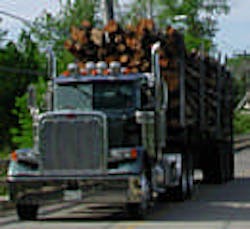A one-year pilot program to test the impact of higher truck weight limits on Maine's interstate highways is drawing both support and flak as Congress prepares to vote on the measure.
Sen. Susan Collins (R-ME) won approval and funding for the pilot program from the Senate Appropriations Committee in late July, which would exempt Maine's Interstate highways from the 80,000-lb federal truck weight limit. The Senate plans to vote on the measure this week to allow 100,000-lb, six-axle single-trailer rigs to access Maine’s Interstate highway network for one year to detail the impact on roadways.
“This has always been one of my top priorities in the Senate … [as] Maine's Congressional delegation has been working on this issue since 1994 when the U.S. Department of Transportation first notified the state of Maine that it was in violation of federal vehicle weight requirements,” Sen. Collins said on her web site in July. “That is why I am delighted that, after a lot of hard work, I have successfully convinced my colleagues … to approve a one-year pilot project .”
Collins added that improved safety is the main goal of the program, as drivers of heavier trucks in Maine are currently forced off the highway and onto secondary roads that pass through cities, towns, and rural neighborhoods.
The program is drawing support from several corners within the shipping and transportation community. “Sen. Collins recognizes the fact that allowing heavier, more efficient trucks on our nation’s Interstates will improve highway safety and reduce fuel use and emissions,” said John Runyan, executive director of the Coalition for Transportation Productivity (CTP) said in a letter to Sen. Collins.
“This [pilot] program will make roads safer by consolidating freight on fewer trucks and by taking heavy trucks off rural roads that often wind through towns, passing schools and driveways, and putting them on better-engineered, divided, multi-lane interstate highways,” he continued. “U.S. manufacturers are also forced to rely on expensive freight consolidation because our major trading partners have higher truck weight limits, but Sen. Collins’ provision would help Northeastern producers compete for market share and efficiently export goods to Canada.”
However, several public interest groups – notably Citizens for Reliable and Safe Highways (CRASH) – are actively seeking to get the program voted down. They contend heavier trucks are a safety risk and that Maine’s pilot program would encourage trucking interests in other Northeast and mid-Atlantic states to use it as a “springboard” to seek Congressional repeal of the federal truck weight exemption in other states and even nationwide.
“This special interest provision was quietly inserted into this federal legislation without any public input and without any public hearings,” said Joan Claybrook, chair of CRASH, in a news release. “This is straight out of the trucking industry’s playbook as they work in the shadows of the Capitol to pick off one state and then another as part of their nationwide strategy to bypass public scrutiny and overrun today's rules of the road.”
CRASH, joined by other public interest groups such as Parents Against Tired Truckers (P.A.T.T.), Advocates for Highway and Auto Safety, and the Consumer Federation of America, said in a letter to members of the U.S. Senate that this exemption “is only a pretext for permanently raising the weight limit to 100,000 lbs on Maine's I-95 interstate and in other states, making that highway even more treacherous.”
About the Author
Sean Kilcarr
Editor in Chief
Sean Kilcarr is a former longtime FleetOwner senior editor who wrote for the publication from 2000 to 2018. He served as editor-in-chief from 2017 to 2018.
